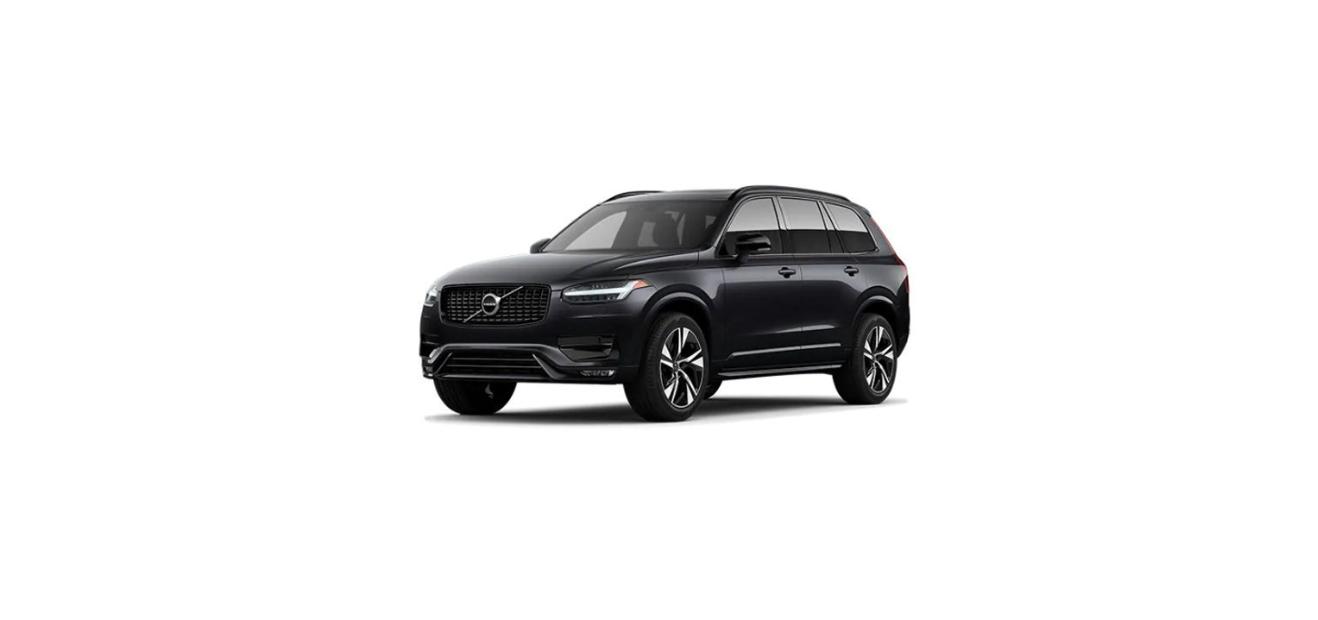2022 XC90 Volvo Changing Wheels

Changing wheel
- If a wheel must be changed in a trafficked environment, passengers must stand in a safe place.
- Use a jack designed for the car when changing tyres. Use supports to secure the car for all other work.
- Never crawl under the car or reach under with a part of your body when it is raised on a jack.
- Passengers must leave the car when it is raised on the jack.
Important
The jack included with the car is only designed for occasional, short-term use, such as when changing a wheel after a puncture. Only the jack belonging to the specific model is to be used to jack up the car. If the car is to be jacked up more often, or for a longer time than is required just to change a wheel, the use of a garage jack is recommended. In this instance, follow the instructions for use that come with the equipment. When the jack is not in use it must be stored in its storage space under the cargo area floor. The jack needs to be cranked together to the correct position in order to have space.
Removing a wheel
- Read through all instructions before beginning.
- Take out the tools needed before jacking up the car.
- Activate the hazard warning flashers and set out a warning triangle if a wheel shall be changed in a trafficked location.
- Make sure that the parking brake is activated and engage gear position P.
- Chock in front of and behind the wheels that remain on the ground. Use, for example, heavy wooden blocks or large stones.
- Screw together the towing eye with the wheel wrench to the stop position.
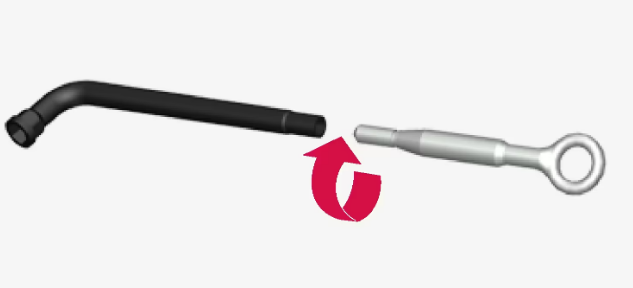 Remove the plastic caps from the wheel bolts with the intended tool.
Remove the plastic caps from the wheel bolts with the intended tool.- With the car still on the ground, use the wheel bolt wrench/towing eye to undo the wheel bolts ½-1 turn by pressing downwards (anticlockwise). Always start with the lockable wheel bolts.
- Follow the instructions for how to safely raise the car with the jack.
- Raise the car high enough to allow the wheel to be removed to move freely. Remove the wheel bolts and lift off the wheel.
Mounting a wheel
- Clean the surfaces between the wheel and the hub.
- Put on the wheel. Ensure that the correct dimension is fitted in the correct position for cars with different front and rear tyres or wheel dimensions.
- Tighten the wheel bolts thoroughly.
- Do not use lubricant on the threads of the wheel bolts.
- Lower the car so that the wheels cannot rotate.
- Tighten the wheel bolts crosswise.
- It is important that the wheel bolts are tightened properly.
- Tighten to 140 Nm (103 foot-pounds).
- Check the tightening torque with a torque wrench.
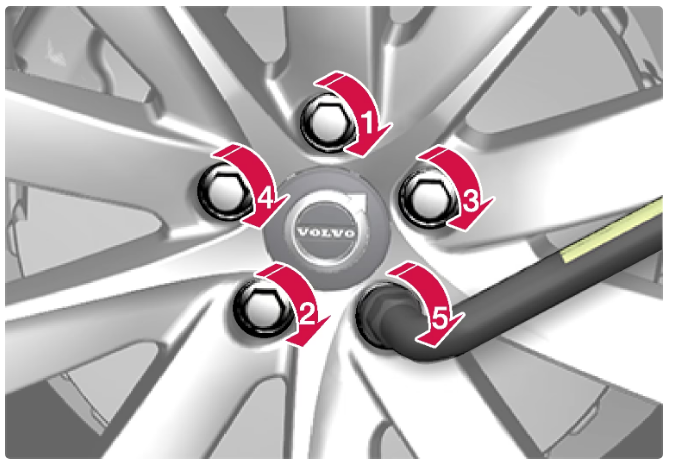 Refit the plastic caps over the wheel bolts.
Refit the plastic caps over the wheel bolts.- Check the tyre pressure and save the new tyre pressure in the system for tyre pressure monitoring.
Warning
The wheel bolts may need to be re-tightened several days after the wheel change. Temperature differences and vibration may mean that they are not attached equally as tightly.
Note
- After a tyre has been inflated, always refit the dust cap in order to avoid damage to the valve from gravel, dirt, etc.
- Only use plastic dust caps. Metal dust caps can rust and become difficult to unscrew.
Jack
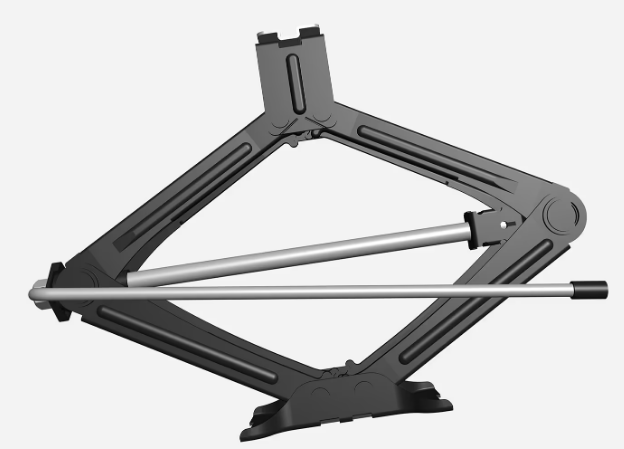
Wheel bolts
- Wheel bolts are used to attach the wheels to the hubs.
- Only use rims that are tested and approved by Volvo and which are Volvo genuine accessories.
- Check the tightening torque of the wheel bolts with a torque wrench.
- Do not use lubricant on the threads of the wheel bolts.
Temperature differences and vibration may mean that they are not attached equally as tightly.
Lockable wheel bolt kit
To loosen or tighten the lockable wheel bolts – turn the wrench in the lock bolt until it fully engages in the code grooves. Always start with the lockable wheel bolts if the wheel shall be removed. When fitting the wheel, finish with the lock screw.
Spare wheel
The spare wheel is only designed for temporary use. Replace it with a normal wheel as soon as possible.
The car’s driving characteristics can be changed when the spare wheel is used and the ground clearance is reduced.
Do not wash the car in an automatic car wash if the Temporary Spare is being used.
Recommended tyre pressure must be maintained regardless of the position of the temporary spare wheel on the car.
If the spare wheel is damaged, a new one can be purchased from a Volvo dealer.
- Never drive faster than 80 km/h (50 mph) with a spare wheel fitted on the car.
- The car must never be driven fitted with more than one “Temporary Spare” wheel.
- The car may have different driving characteristics while driving with the spare wheel. The spare wheel must be replaced with a normal wheel as soon as possible.
- The spare wheel is smaller than the normal wheel, which affects the car’s ground clearance. Look out for high kerbs and do not machine-wash the car.
- Follow the manufacturer’s recommended tyre pressure for the spare wheel.
- On all-wheel drive cars, the drive on the rear axle can be disengaged.
- If the spare wheel is fitted to the front axle then it is not possible to use snow chains at the same time.
- The spare wheel must not be repaired.
Handling the spare wheel
Taking out the spare wheel
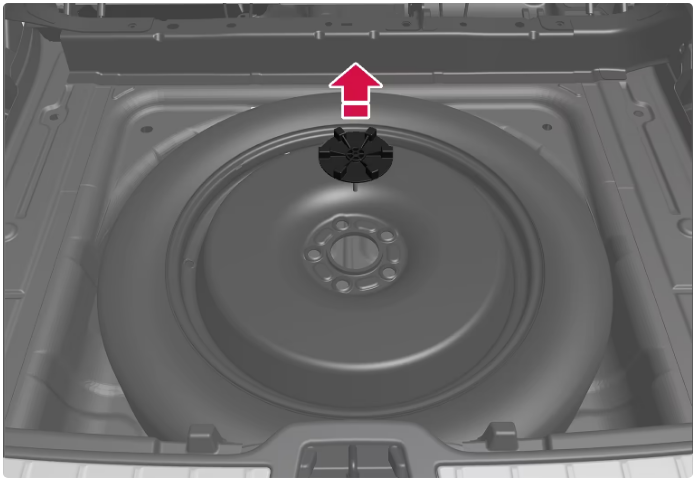 The illustration is generic and the appearance may differ.
The illustration is generic and the appearance may differ.- The spare wheel is located under the cargo area floor in the spare wheel well with the outside upwards.
- The spare wheel is secured with the same bolt that attaches to the body.
- The foam block contains all the tools for changing a wheel.
- Fold up the cargo area floor.
- Undo the retaining screw.
- Lift out the spare wheel.
Storing the punctured tyre
Screw back the mounting screw that held the spare wheel in place.
Snow chains
Volvo recommends that snow chains are not used on wheel dimensions greater than 19 inches
- Use Volvo genuine snow chains or equivalent chains designed for the car model, and tyre and rim dimensions.
- Only single-sided snow chains are permitted.
- In the event of uncertainty about the show chain, Volvo recommends that an authorised Volvo workshop should be contacted.
- The wrong snow chains may cause serious damage to the car and lead to an accident.
- Using snow chains may result in a malfunction of the tyre pressure monitoring system.
- Always follow the mounting instructions from the manufacturer carefully. Fit the chains as tension as possible and tension them at regular intervals.
- Snow chains must only be used on the front wheels (also applies to all-wheel drive cars).
- In some cases, snow chains must NOT be used, such as if accessory, aftermarket or “special” tyres and wheels are fitted that have a different size to the original tyres and wheels. Sufficient distance must be maintained between the chains and brakes, suspension and body components.
- Check local regulations with regard to using snow chains before fitting them.
- Never exceed the chain manufacturer’s specified maximum speed. You must never exceed 50 km/h (30 mph) under any circumstances.
- Avoid bumps, holes or sharp turns when driving with snow chains.
- Avoid driving on bare ground as this wears out both the snow chains and tyres.
- Driving with snow chains may have a negative effect on the car’s driving characteristics. Avoid fast or sharp turns, as well as braking with locked wheels.
- Some types of chains that are firmly tensioned affect brake components and must therefore NOT be used.
- You can obtain more information on snow chains from a Volvo dealer.
Winter tyres
- Winter tyres are adapted for winter road conditions.
- Volvo recommends winter tyres specially developed for winter driving on all wheels if there is a risk of snow or ice.
- Tyre dimensions are dependent on engine variants. When driving on winter tyres, the correct type of tyres must be fitted to all four wheels.
Tips for changing to winter tyres
When summer and winter wheels are changed, mark which side of the car they were mounted on, for example, L for left and R for right.
Contact a Volvo dealer for advice on which rim and tyre type suit your car best.
Studded tyres
Studded winter tyres should be run in gently for 500-1000 km (300-600 miles), so the studs settle properly into the tyres. This gives the tyre, and especially the studs, a longer service life.
Tread depth
Road conditions with ice, slush and low temperatures place considerably higher demands on tyres than summer conditions. Volvo, therefore, recommends not driving on winter tyres that have a tread depth of less than 4 mm (0.15 inches).
Punctures
- Activate the hazard warning flashers if the car has a puncture in a trafficked environment.
- Think about safety. If possible, move the car out of danger from traffic. Call roadside assistance if necessary.
- If possible, exit the car from the side with the least traffic.
- Put on a reflective vest and then position the warning triangle so that other road users are warned in good time.
Dealing with a puncture
The car is equipped with either a puncture repair kit for temporary tyre repair or a spare wheel, see the respective section for user instructions.
Tool kit
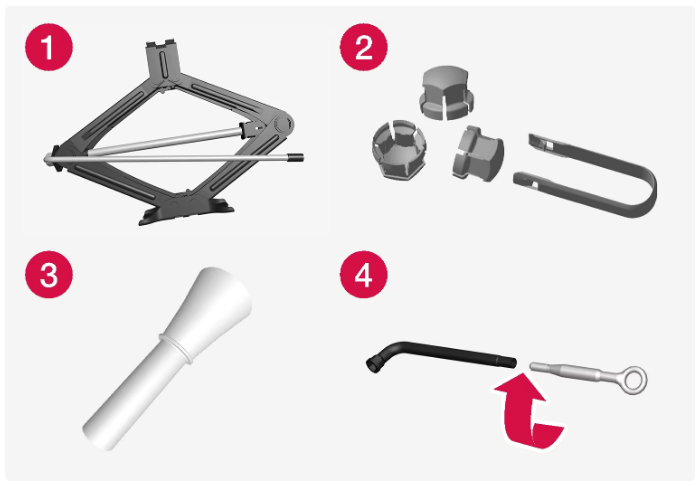 Examples of tools.
Examples of tools.- Jack
- Tool for removing the plastic caps from the wheel bolts
- Funnel for filling fluids
- Wheel wrench and towing eye
- If the car is fitted with a spare wheel, there is a jack and a wheel bolt wrench instead of an emergency puncture repair kit.
